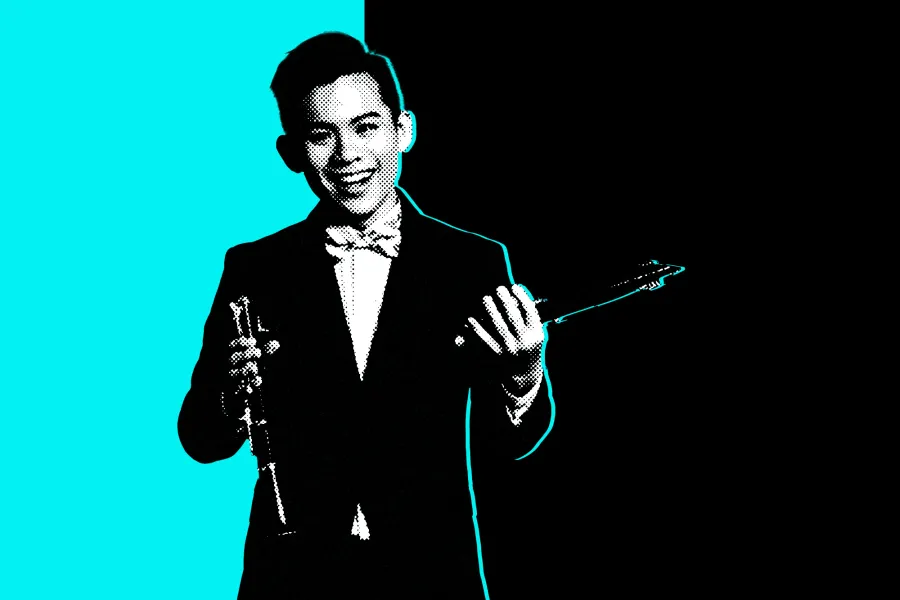
Farkhad Khudyev, conductor
Matthew Pavon, guest conductor
Featuring Competition Winners
Jacob Feldman, saxophone
Sophio Dzidziguri, mezzo soprano
Maria Parrini, piano
This concert will last about 64 minutes with one intermission.
Please silence your electronic devices.
Photography, video, or recording of any part of this performance is prohibited
Program
Nigel Westlake
Spirit of the Wild
Jacob Feldman, saxophone
Matthew Pavon, conductor
Vincenzo Bellini
I Capuleti e I Montecchi
"Lieto del dolce incarco" /
"Se Romeo t'uccise un figlio"
Sophio Dzidziguri, mezzo-soprano
intermission
Ludwig van Beethoven
Piano Concerto No. 4 in G Major, Op. 58
Allegro moderato
Andante con moto
Rondo: Vivace
Maria Parrini, piano
About the Program
Program notes by Mark Bilyeu except where noted.
Nigel Westlake
Spirit of the Wild: Concerto for oboe
Born 1958, Perth, Australia
Composed 2016
Premiered February 22, 2017, Sydney Orchestra, Sydney Opera House, Diana Doherty, oboe, David Robertson, conductor
Duration 22 minutes
In mid 2016, following concert commitments in Hobart, I was invited by Bob Brown, one of Australia's leading environmentalists, to accompany him on a visit to Bathurst Harbour, a pristine waterway on the South West Coast of Tasmania contained within the Tasmanian Wilderness World Heritage Area. Almost completely devoid of modern human intrusion, the area was the home of the Needwonnee people for many thousands of years, and is accessible only by boat, plane or foot. My introduction to this place of exquisite beauty became the backdrop to my next project, an oboe concerto commission for the Sydney Symphony, and as I pondered the ensuing collaboration with soloist Diana Doherty, the memories and significance of my expedition with Bob continued to infuse my consciousness, leaving their fingerprints on the concerto score in subtle and mysterious ways. As a young boy, my parents had introduced me to the wilds of Tasmania and I am forever grateful to them for instilling in me a deep love of Australia's wilderness fostered during numerous walking and boating expeditions. My trip to Bathurst Harbour reminded me of the preciousness of the wilderness, and of mankind's propensity to become subsumed by materialism, neglecting our connection to country and the wonders of the natural world, choosing instead to value only those elements of our environment that can be quantified by monetary worth. Such wild places are truly priceless and we exploit and destroy them at our peril. Performed in a continuum, the concerto can be divided into 4 distinct sections, the first 2 of which are closely related in terms of energy and contour. The third section is a slow movement where long, sustained oboe phrases are supported by a detailed filigree of repeated patterns that ebb and flow in dynamic waves. A syncopated string hocket forms a bridge to the final section which is perhaps the most playful & extrovert in manner, building as it does to a traditional style big finish.
– Nigel Westlake
Vincenzo Bellini
Capuleti e i Montecchi:
"Lieto del dolce incarco" / "Se Romeo t'uccise un figlio" (Act I, No.3)
Born November 3, 1801, Catania, Italy
Died September 23, 1835
Composed 1830
Premiered March 11, 1830, Teatro La Fenice in Venice,
Duration 10 minutes
Bellini was not the first choice of Venice’s Teatro La Fenice for their featured 1830 Carnival season world premiere. That commission was offered to a composer whose star had recently surpassed Bellini: Giovanni Pacini. In fact, in 1830, Bellini wasn’t sure he would ever receive another opera commission. His 1829 opera Zaira had been a total flop (“actual boos and hisses from the audience” sort of flop), and his career seemed to be doomed. It was his good fortune, however, that Pacini had overcommitted, and the director of the Venice theatre rescinded the contract, and offered it to Bellini. The only catch? Bellini had just 45 days to both write and rehearse the work. Feeling the time crunch, he quickly settled on a libretto by Felice Romani—an adaptation of the well known Shakespeare play—which casts the Capuleti and Montecchi as rival political factions, rather than Shakespeare's vision of them as "two households, both alike in dignity." In order to complete the work on time, Bellini recycled nearly half of his flopped Zaira, which audiences either didn’t realize, or didn’t care about: Capuleti e i Montecchi was an unequivocal success, and righted the floundering ship of Bellini’s career. In this famous first act aria, Romeo, in disguise, has come to the Capuleti to plead for peace and for Juliet's hand.
Ludwig Van Beethoven
Piano Concerto No 4 in G Major, Op. 58
Born December 16, 1770, Bonn, Germany
Died March 26, 1827, Vienna, Austria.
Composed 1806
Premiered December 22, 1808, Theatre an der Wien, Vienna Austria
Duration 35 minutes
Just days before Christmas in 1808, Vienna’s Theater an der Wien hosted a benefit concert. The concert hall was sold out, and a good thing: because the heating was not working properly, and the warmth of other concert-goers was imperative as they watched Ludwig van Beethoven conduct a four-hour long concert which consisted entirely of premieres of his own music. On the program? movements of his Mass in C Major, a concert aria, his Sixth Symphony, a piano improvisation, the Choral Fantasy, his Fifth Symphony, and his Fourth Piano Concerto, performed by Beethoven himself (it would be the last time Beethoven would appear publicly as a soloist). This concerto is unlike his other four piano concertos: there is a sense of calm unwinding, less of a need for showmanship, and more a desire to communicate. Rather than beginning with a full orchestral introduction, the work opens with the soloist: a radical choice for the time. The first movement is based primarily on the piano’s opening theme, while the second movement’s dialogue between the piano and the orchestra has inspired many musicologists to ascribe a narrative where there is none. The pianist Wilhelm Kempff wrote that “On the two pages of full score which this movement occupies, there are few notes. Instead there are many rests, which sit like black, sinister birds on the lines of the music, signs signifying a silence which takes the breath away.” The final movement bursts out of the introspection with a rollicking rondo that showcases the virtuosity of the soloist in new ways. A review in the Allgemeine musikalische Zeitung stated that the concerto was “the most admirable, singular, artistic and complex Beethoven concerto ever.”
About the Artists
Jacob Feldman

Jacob Feldman is a performer, educator, and chamber musician based in Austin, Texas. He is currently pursuing a master’s degree in saxophone literature and pedagogy at The University of Texas at Austin with Dr. Stephen Page. As he works toward his degree, he teaches private saxophone and music theory lessons in the Austin area. As a soloist, Jacob was recently awarded the Gold Medal at the Young Texas Artists Music Competition, and named the winner of The University of Texas at Austin Concerto Competition with his arrangement of Nigel Westlake’s Spirit of the Wild. He is the alto chair of his saxophone quartet, Zed, who recently won First Prize at both the Plowman Chamber Music Competition and MTNA National Chamber Music Competitions, as well as a silver medal at the Fischoff Chamber Music Competition. Jacob regularly performs with The University of Texas Wind Ensemble, with whom he recently traveled to New York City to play at Carnegie Hall. During their 2024 season, he was a featured concerto soloist for the consortium premiere of Viet Cuong’s Second Nature. He earned his bachelor of music degrees in music education and saxophone performance from Michigan State University, where he studied with professor Joseph Lulloff.
Matthew Pavon
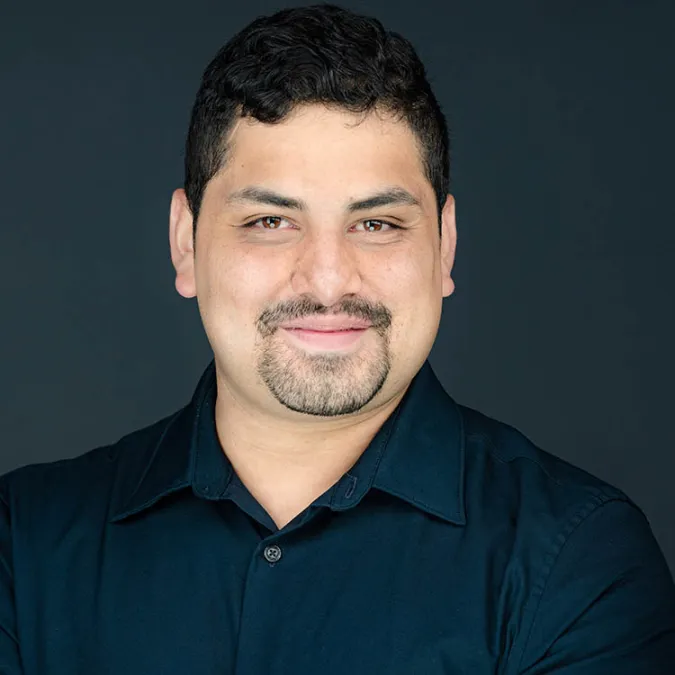
Matthew Pavon is a conductor and violist studying for a master's in music for orchestral conducting under Farkhad Khudyev at the Butler School of Music. In his role as teaching assistant for University Orchestras, Matthew assists in conducting and administrating the University Symphony Orchestra and Co-Directs the University Orchestra. Matthew has served as the graduate conductor of the Missouri State University Orchestra. Upon receiving his M.M. in viola performance, he continued as the assistant conductor for Missouri State University from 2022 to 2023. His guest conducting appearances have included concerts with ensembles like the Kansas City Civic Orchestra, the Missouri Philharmonic, and the Drury University Orchestra. A strong believer in supporting the arts in his communities, Matthew is the founder and former artistic director of the Galloway Chamber Orchestra in Springfield, MO. He is also currently the workshop conductor for the Youth Symphony of Kansas City. Matthew lives in Austin, TX with his wife, Leianna, and their mini-Australian Shepherds, Koda and Ellie.
Sophio Dzidziguri
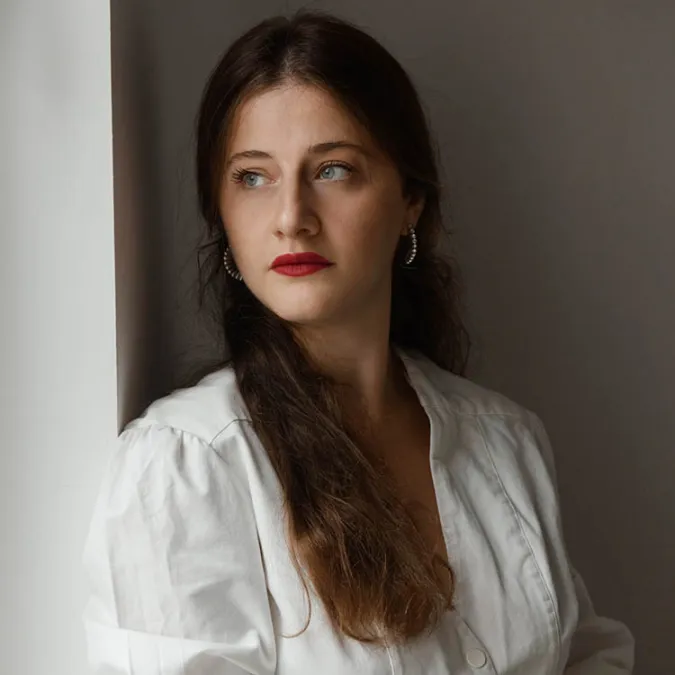
Sophio Dzidziguri is a talented Georgian mezzo-soprano known for her rich voice and diverse operatic repertoire. She graduated from the Vano Sarajishvili Tbilisi State Conservatoire and later pursued advanced studies at the Butler School of Music, where she is currently completing her master’s in opera performance (I year). Sophio has made a significant mark in the opera world, including her recent success in winning the 2025 Concerto Competition, She also has made her debut in the Opera The Ghosts of Versailles, where she sung the role of Samira (Women in the Heat) and in Le nozze di Figaro as Cherubino, both perfromed at the McCullough Theatre in Austin, Texas. Her past performances showcase her versatility, having performed in operas such as The Magic Flute, Werther, Keto and Kote, and West Side Story, along with her notable appearance in Le nozze di Figaro. Her artistic journey reflects a blend of classical and modern opera, contributing to her growing reputation in the international opera community.
Maria Parrini
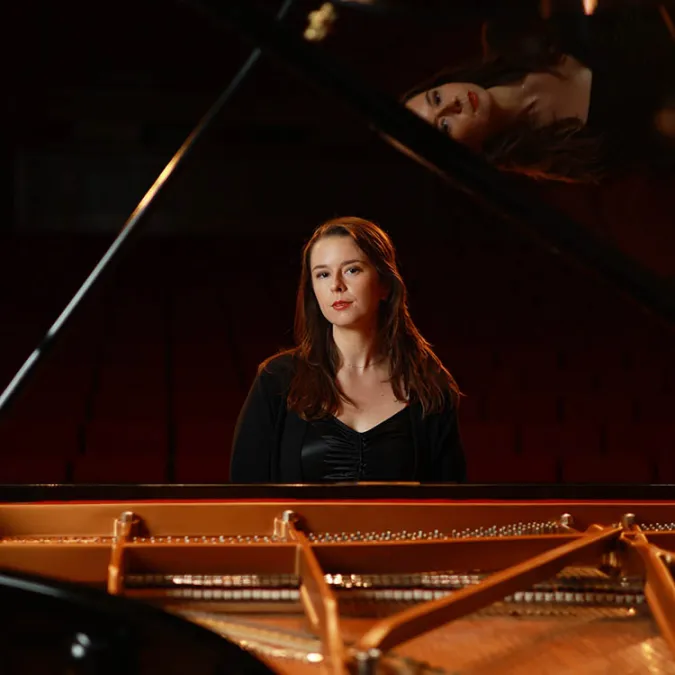
Maria Parrini has given over one thousand performances of chamber and solo music as pianist of the Lincoln Center Stage Quintet onboard Holland America Line cruise ships. Her top prizes include the Atlanta Music Club Graduate Piano Award, the Thousand Islands International Piano Competition, the Darius Milhaud Performance Prize at the Cleveland Institute of Music, and the concerto competitions of Brevard Music Center, The University of Texas at Austin, and Columbus State University. In partnership with Pan Harmonia Chamber Music of Asheville, NC, she commissioned and premiered two piano suites in 2024: UMI by Amane Sakaguchi and forgotten music by Isaiah Saranow. In 2023, she gave her harpsichord debut in Bach’s Brandenburg Concerto No. 5 with the Virtuosi String Ensemble of Columbus State University. An alum of Kneisel Hall Chamber Music and the Atlantic Music Festival Contemporary Ensemble, she has also performed in masterclasses for legendary teachers such as Natalya Antonova, Matti Raekallio, and Sergei Babayan. Parrini is currently pursuing a D.M.A. in piano performance at the Butler School of Music where she studies with Anton Nel. Her previous teachers, to whom she is perpetually grateful, include Esther Park, Henry Kramer, Antonio Pompa-Baldi, Paul Schenly, and her parents Sherry and Fabio Parrini.
Farkhad Khudyev
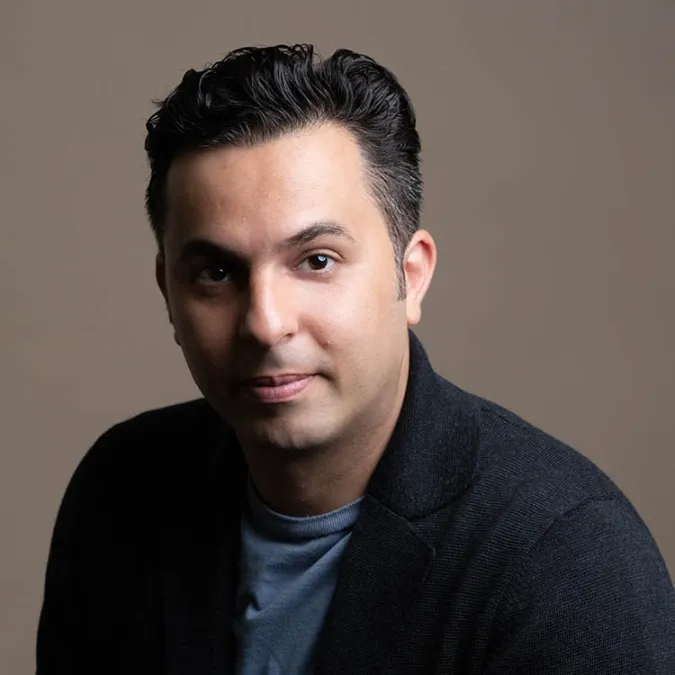
Farkhad Khudyev is the winner of the Gold Medal “Beethoven 250” at the 1st International Arthur Nikisch Conducting Competition; the Solti Foundation US 2018 and 2022 Career Assistance Award; the Best Interpretation Prize at the 1st International Taipei Conducting Competition; the 3rd prize at the 8th International Sir Georg Solti Conducting Competition; and the Gold Medal/Grand Prize at the 2007 National Fischoff Competition. Khudyev has worked with orchestras worldwide including the London Philharmonic Orchestra, Frankfurt Radio Symphony Orchestra, Frankfurt Opera Orchestra, Danish National Symphony Orchestra, Seattle Symphony, Dallas Symphony, Los Angeles Philharmonic, San Diego Symphony, Monterey Symphony, George Enescu Philharmonic Orchestra, Xi’an Symphony Orchestra and the State Taipei Chinese Orchestra. Farkhad was born in Turkmenistan, where he studied at the State Music School for gifted musicians, and then completed his studies at Interlochen Arts Academy, Oberlin Conservatory and Yale University. Khudyev serves as the Music Director of the University of Texas Symphony Orchestra in Austin, and the Orchestral Institute at the Hidden Valley Institute of the Arts in Carmel, California.
Symphony Orchestra
Violin I
Misa Stanton, concertmaster
Sui Shimokawa
Thomas Gougeon
Yusong Zhao
Wai Shan Ma
Brandon Garza
Mia Zajicek
Jackie Shim
Suhaas Patil
Kai Lindsey
Violin II
Summer Bradshaw, principal
Mei Liu
Chloe Yofan
Tina Zhao
Lamu Zhaxi
Qiyan Xing
Evelyn Lee
Oliver Fiorello
Wells Gjerlow
Suhyun Lim
Jimmy Shim
Pedro Salas
Viola
Emily Whitney, principal
Anahit Matevosyan
Dean Roberts
Gwanji Lee
Grace Dias
Alice Wei
Gauri Binup
Cello
Katsuaki Arakawa, principal
Aili Kangasniemi
Nicole Parker
Yilin Xu
Je-Shiuan Hsu
Christopher Tran
Xinke Fu
William Han
Yochen Zhong
Double Bass
Kaitlyn Ruiter, principal
Lucas Scott
Justin McLaughlin
Mirabai Weatherford
Xingchang Ye
Shiying Feng
Darrin Luong
Dublin Steding
Flute
Molly Damito 3
Eunha Kim
Kathryn Worsham 2
Oboe
Julia Frank 2
Zane Laijas 3
Clarinet
Jacob Bricker 1
Chase Cano 2
Nathan Richey
Bassoon
Wesley Booker 2
Jolie Hammerstein 3
Rishabh Sajjan
Horn
Stephanie Chiang 1, 2
Daniela Garcia
Cheryll Huddleston 3
Ian Welch
Trumpet
Harmon Byerly 1, 2
Jax Latham
Trombone
Arsene Bien-Aime 2
Josh Stout
Bass Trombone
Wyatt Andrews
Timpani
Matt Garcia 3
Marcos Jurado 2
Kaiwen Luo 1
Percussion
Joel Carter
Matt Garcia
Ethan Hall
Marcos Jurado
Kaiwen Luo
Seth Underwood
Piano
Xiaoyi Lin
Harp
Hannah Beeler
Principals
1. Westlake
2. Bellini
3. Beethoven
Event Details
$5–15
All University of Texas at Austin students are allowed one free ticket as long as they are available. Student tickets must be picked up at the Box Office with valid student I.D. Seating is unassigned.
If you are a patron with ADA needs, please email tickets@mail.music.utexas.edu and we will reserve ADA seating for you.

